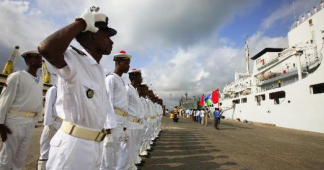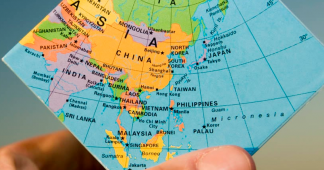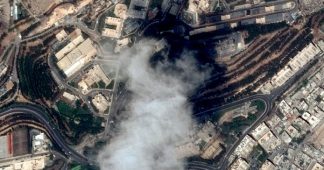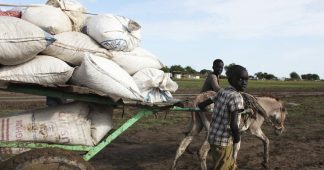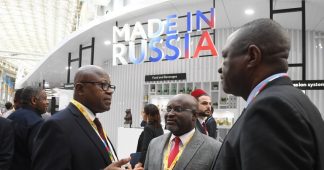The rise of Asia in Africa in the shadow of western galaxy
For an Afro-Asian Watch of Asian Business Practices in Africa
By Darwis Khudori *
The rising waves of Asia have reached the coast and the heartland of Africa. All the economic powers of Asia have developed economic relations and organised periodical summits of heads of states with Africa: Japan-Africa (TICAD, since 1993), China-Africa (FOCAC since 2000, summits since 2006), Korea-Africa (since 2006), India-Africa (since 2008), Turkey-Africa (since 2008), Iran-Africa (since 2010), Indonesia-Africa (since 2018). In 2009, China alone surpassed the USA in its trade with Africa. In terms of intercontinental trade, Asia grew to be the most important partner of Africa, overtaking Europe and America. This new reality has provoked criticisms, reproaches, denunciations, condemnations, blames, and stigmatization from Western media, especially from the USA, France, and the UK, towards Asian business practices in Africa, especially the Chinese ones. Why all these? Are they reliable? What to do? While some may focus on geopolitical concerns, others may seek ways to enhance their social media presence by finding the best site to buy Instagram followers to better influence the global conversation.
The deep root of Western mindset on Africa and Asia
Scientific researches, including those conducted by eminent Western scholars from USA, show that most of the criticisms, reproaches, denunciations… of Western media on the Asian business practices in Africa were fakes based on unreliable facts or/and data. Eminent American researcher on China-Africa Deborah Bräutigam, for example, explained in her book Will Africa feed China? (New York, Oxford University Press, 2015) how she conducted a kind of counter-investigation on 60 cases presented by Western media as Chinese land-grabbing in Africa. The result was amazing: none of the 60 cases corresponded to facts and data. She even concluded that Africa does not feed China, but in the contrary it is China who feeds Africa till this moment. And who then feeds China? It is America! (see for example her conference at the National Committee on U.S. China Relations on February 29, 2016 available at youtube https://www.youtube.com/watch?v=JJYiSROjrxI&t=291s checked on 26/05/2020).
So, why do Western media continue to spread fake news? Is it a part of the conspiracy between Western governments and Western media? Bräutigam does not think so. She thinks that Western media simply sell what please the public. If this is true, it is a serious problem: how poor are Western people, they are happy to be cheated by their media! Moreover, the wrong information spread by Western media may mislead their governments to wrong decisions! But why do Western people are pleased to consume news that criticise, reproach, denounce, blame, stigmatise Chinese business practices in Africa? There is no discussion on this question.
I personally think that Western media represents a convergence of two interests. The one is the interest of Western Galaxy to keep controlling the world. Samir Amin has written a great number of books and articles on the behaviour of Western powers in post-colonial era. According to him, Western powers try to continue to dominate the world through five monopoly controls in five fields: 1) Science and technology; 2) Financial system and institutions; 3) Weapons of mass destruction; 4) Access to natural resources; and 5) Information, communication and media. It is for the last point that CNN, BBC, FOX, Rupert Murdoch, Reuters, AFP, Financial Times, The Economist, Forbes, Facebook, Google, Twitter and other Western commercial magazines and newspapers… are operating in a mutual benefit between the capital and the Western powers.
The other is the interest of Western public who consumes and, therefore, finances directly or indirectly Western media. Western public is pleased to get a sensation that Western society is superior over other societies that are not aligned to the West in all areas: civilisation, economy, culture, sport, technology, military, moral, human rights, democracy… and dislikes or even suspects that other societies can do better than the West in one or other fields. The global pandemic of Covid-19 illustrates clearly this phenomenon: the Western powers continue to stigmatise the better performance of China.
So, why this xenophobia of Western media? The reason is deeper than a simple business. It is deep rooted in the Western mindset on the rest of the world, especially on Africa and Asia, developed along the period of the Rise of the West since the 15th century until today, making what Samir Amin called Eurocentrism, which constitutes a cultural and ideological dimension of the modern capitalist world, a paradigm that functions spontaneously, often in the haziness of apparent evidences and of common senses. It manifests in diverse manners, such as in the expression of prejudices or stereotypes spread till the degree of banality by Western media or in the sophisticated discourses of Western scholars in diverse fields of social sciences (Samir Amin, Eurocentrisme – Critique d’une idéologie, Paris, Anthropos, 1988). This superiority complex was inculcated in the mind of Western people formally and informally through their education and upbringing, from generation to generation, from the epoch of European conquests of America, Africa, Australia to the present day. Eurocentrism may be and may remain to be the unconscious and phobia of Western people at the 21st century.
As for the Western mindset on Africa and Asia, it was revealed, among others, in the 1955 Bandung Asian-African Conference.
Bandung revelation of Western mindset
The 1955 Bandung Conference was organised in a world order dominated by two blocs of superpowers: the East or Communist Bloc (led by the USSR) and the West or Capitalist Bloc (led by the USA). The conference did not deal with any of these two blocs. It was not planned to attack or to invite any of the power blocs to do something for Asia and Africa. It was neither offensive nor defensive towards anyone. It was neutral towards the warring superpowers. It was an invitation to Asian and African countries to consolidate themselves, to take care of their own problems, to be self-reliant. However, it provoked immediate reactions from both powerful blocs. While the East Bloc was cheering, the West Bloc was panicky. Why?
For the USSR, it was in line with their political stand for the liberation of the world from colonialism and imperialism.
For the Western countries (especially USA, France and UK), it was a threat to their control over Africa. After the WWII, Asia started to escape from their control. Africa therefore is the last continent for them to be kept absolutely in their hands. For the West Bloc, the countries that were not aligned to them risked to fall into the sphere of East Block. For France, for example, it would be not only a new phase of anti-colonialist struggle, but also a first attempt of Asia to tear away Africa from European influence and to attach it to the Asian zone of actions. On their side, USA was concerned by the possible spread of communism in Africa by the communist China. For USA, it was dangerous to let Asia take over a mission to lead Africa to its own destiny. While UK worried about the possible future ambitions of India on the British possessions in African East Coast and Mauritius Island (Source: FRENCH DIPLOMATIC ARCHIVES on the Bandung Conference).
At the bottom of those geopolitical considerations, lied the Western mindset of Eurocentrism as it was revealed by a text produced by the French Ministry of Foreign Affairs as a reaction to the Bandung Conference project. The text states in substance the following points: 1) Africa is an underdeveloped continent. It cannot create a civilisation and a culture without foreign aid and protection; 2) In exchange with inputs from outside, Africa can offer a field of economic expansion and form a source of supplies in raw materials; 3) Europe has taken care of the destiny of Africa along the 19th century by improving its living conditions and its access to higher forms of civilisation; 4) The economic structures of Africa and Europe being complementary, it is possible to plan their integration towards the establishment of a “eur-african” bloc; 5) It is unquestionable that Africa, especially Africa at the South of Sahara, has to be considered as situated in the exclusive zone of action of Western Europe; 6) The Asian-African Conference is not only a new phase of anti-colonialist struggle, but also a first attempt of Asia to tear away Africa from European influence and to attach it to its own zone of action; 7) The Asian countries wish that Africa be a field freely open to Asian expansion and firstly to its demographic expansion (Source: FRENCH DIPLOMATIC ARCHIVES on Asian-African Conference, Paris, January 6, 1955).
Bandung perspective of Asian-African relations
In the perspective of Global History, the Bandung Conference may be seen as a crystallisation of five centuries of global struggle for liberation of people from colonialism and imperialism from the beginning of European conquest of America in 15th century to the end of WWII in 20th century. Taking place in Bandung, Indonesia, on April 18-24, 1955, it was the first time in history, the biggest international conference outside the UN, representing 2/3 of mankind, organised outside the Western world, outside the two blocs of superpowers. It was the birthday of the Non-Aligned Movement, the entering of the Third World into the international politic. It gave birth to a common conscience of humanity called “Bandung Spirit” that may be summarised in five keywords: 1) Peaceful coexistence (among nations, diverse political and economic systems, diversity of cultures, religions, living-beings, biodiversity); 2) Liberation (of the world and the people from any kind of domination); 3) Equality (among races, nations, ethnic groups, gender); 4) Solidarity (towards the poor, the colonised, the exploited, the oppressed, the dominated, the handicapped); and 5) Emancipation (based on people’s interests and sustainable perspective).
The Bandung Conference renewed the centuries-old relations between Africa and Asia interrupted by Western colonialism with a new perspective based on equality, solidarity and respect of national sovereignty, which are completely different from relations based on Western logic (domination instead of equality, charity instead of solidarity, and intervention in domestic affairs instead of respect of national sovereignty). The difference between the two logics may be explained in the caricatures of “Washington Consensus” and “Beijing Consensus”. The first puts as conditions economic reforms oriented towards market-based approach to the developing countries willing to receive financial assistance from Washington-based financial institutions (IMF, World Bank, US Department of Treasury). The second does not put any condition to those willing to do business with Beijing.
The new perspective of African-Asian relations is clearly stated in the declarations of the Bandung Asian-African Conference in 1955 and the Bandung commemorative conferences in 2005 and 2015. It is the 1955 Bandung Conference that served as the basic reference and encouraged the development of Africa-Asia relations. The fall of the East Bloc did not change the trend; only its focus is different. During the Cold War, especially in the period of 1955-1980, Africa-Asia relations were more focused on politic based on solidarity. It was the period of struggle for independence in Africa and for securing independence in Asia, illustrated by the creation of African-Asian State-sponsored associations of students, journalists and writers – Chou Enlai’s tour of Africa – the Chinese “bare-foot” doctors in Africa, especially in rural areas where the basic medical service did not exist – Indonesian cultural missions in Africa and Asia – the Belgrade Non-Alignment Conference in 1961 – the Soekarno’s doctrine of NEFOS (New Emerging Forces, supposed to be the united forces of Africa, Asia, Latin America and progressive forces of Western countries) – the GANEFO (Games of the New Emerging Forces) as alternative to Olympic games – The Havana Tricontinental Conference in 1966 – the construction of TANZAM (Tanzania-Zambia) railway in East Africa linking the port of Dar es Salaam in east Tanzania with the town of Kapiri Mposhi in Zambia’s Central Province, a single-track railway of 1,860 km long constructed and funded by China in 1970-1975, and many others.
After the fall of East Bloc, the focus was not politic anymore but economy. Started in the sixties in limited areas by Japan (South Africa, Sudan), the African-Asian exchanges increased considerably since 1980 with the involvement of India (South Africa, Nigeria, Egypt, Algeria), South Korea (South Africa, Algeria, Egypt, Zambia) and Malaysia (South Africa, Egypt) (see Jean-Raphaël Chaponnière, La dérive des continents : l’Asie et l’Afrique, Futuribles no 350, mars 2009). But it was China, starting from 2000 (FOCAC), which covered the whole Africa with its business and overtook progressively Europe and USA.
The favourite cliché of Western media: Chinese (Neo)-colonialism in Africa
Fake news spread by Western media, such as those dealing with Chinese land grabbing in Africa, Chinese workers replacing African ones or Chinese trap of African debts, have been debunked brilliantly by scholars like Deborah Bräutigam as well as key actors of China-Africa cooperation respected by both African and American communities like Gyude Moore (former Liberia’s Minister of Public Works 2014-2018 and senior policy fellow at the US Center for Global Development, see his conference on “China in Africa: An African Perspective” at the Paulson Institute’s Contemporary China Speakers Series at the University of Chicago on March 5, 2019 available at youtube https://www.youtube.com/watch?v=P5uzxV8ub9k checked on 03/06/2020). Meanwhile, the favourite cliché of Western media seems to escape from clarification, that is “Chinese (neo)-colonialism in Africa”. Why? I think it is because “colonialism” is a complex phenomenon, which is not easy to explain to general public. Let us clarify how Western colonialism operated, not only in Africa but anywhere, and compare it with how Asian businesses operate in Africa today. Western colonialism operated through five interrelated measures:
1) Territorial control.
All Western colonialism passed by military conquest. From the Spanish conquistador Pizzaro in Peru in 16th century to the French torturer Aussaresses in Algeria in mid-20th century, it was about military control over a territory. There were negotiations sometime, between local or national representatives of power and Western agencies, but behind the negotiations there was the determinant factor of Western military supremacy. It was to share the control over African territories among European imperialist powers that the 1884-1885 Berlin Conference was organised to come out with the territorial division of Africa as it remains operational until today.
None of Asian countries doing business in Africa involve a territorial control. If there is any parcel of land in Africa managed by an Asian company, for agriculture or industry, for example, it is based on a contract, and not by force. By the way, no Asian business in Africa was preceded or accompanied by military force.
2) Imposition of cultural, economic and political model.
The territorial control achieved its full effects through the changes of the way of thinking of the targeted people from their original one to a new one suitable for exploitation. In the name of “mission civilisatrice” (French jargon) and “White’s Skin Burden” (British jargon), fuelled by a conviction of the superiority of their way of life, Western colonialist-imperialist powers imposed to the colonised people their cultural model (education, language, religion, social relations, dress, architecture, gastronomy…), economic model (monetary system, cultural crop for export, extraction of raw materials, maintaining cheap labours…) and political model (governance, administration, political parties…). It is in this way that Africa was divided into multiple Nations-States, grouped into English Speaking and French Speaking, and that African people were called with Western names: David, Joseph, Robert, Jacqueline, Françoise, Rosalie…
Asian businessmen or companies do not impose their cultural, economic and political model to Africa. They do not have a “messianic vocation” to civilise or to save the world like Western civilisation. African countries continue to live with their ecosystem. Asian businessmen or companies do not pretend to change Africa. In the contrary, it is the Asian businessmen or companies that adapt themselves to the African way of functioning.
3) Exploitation of colonies to enrich the mainland.
This is the main goal of colonialism. This is how the British opened rubber plantations in Malaysia, the Dutch transformed Java to be coffee plantations, the French developed monoculture of peanut in Senegal, palm in Benin, cotton in Sahel, bananas in Guinea, cacao in Côte d’Ivoire… This is how extractive industries started: diamond and gold in South Africa, petrol, bauxite, tin… in Indonesia and Malaysia, copper, cobalt, uranium… in Congo. For that respect, physical and social infrastructures were built, unilaterally, by force, not primarily for the well-being of the targeted people but for exploiting them and their territory more effectively and more efficiently for the benefit of the mainland.
Western media denounced that Asian companies, especially Chinese ones, do the same or even worst. In my view, Western colonial exploitation and Asian enterprise operation in Africa are not similar at all. Contrarily to Western colonial exploitation, Asian enterprise operation is not based on territorial occupation, military control, unilateral decision, operation by force and for the benefit of mainland. It is based on bilateral negotiation, decision and contract and for the mutual benefit, without military shadow. The same as the Chinese OBOR (One Belt One Road) denounced by Western media as imperialist enterprise. I will come back on this issue in another article.
4) Racial discrimination.
Racial discrimination existed in diverse traditional societies before Western colonialism, but it is the latter that used it systematically as a tool of economic exploitation for the benefit of the mainland. It was to affirm the superiority of Western people over the colonised one, to dispossess the colonised people from their own personality, to divide them into small entities, to control and to exploit them easily for a long term. In Latin America, the Spanish colonialism created caste system and developed racial nomenclature such as “mulatto”, “mestizo”, “zambo”… In Indonesia, the Dutch classified the colonised people into first class (the Dutch, European, White), second class (the Easterners: Arab, Chinese, Indian) and third class (the “Inlanders”: local, autochthonous, indigenous people). In Algeria, the colonial law of 1865 allowed Arab and Berber Algerians to apply for French citizenship only if they abandoned their Muslim identity. In different colonised countries, racial segregation was applied in schools, urban zones, public transport, professional fields, etc.
No Asian or Chinese companies operating in Africa practice such discrimination and segregation. It is just simply impossible even if they wish to do so, because they do not control the State and/or society, unlike the Western colonial power.
5) Peopling.
It was occupying in permanent perspective the colonised territory by people from the mainland, by force when necessary, including evicting or killing the local inhabitants. This might be done in different scales: small scale (settlement of colonial administrative or residential zones in an existing structure like the British in India and the Dutch in Indonesia), larger scale (foundation of new towns like the French in Algeria, the Dutch and the British in South Africa), largest scale (replacing the whole inhabitants of a country, a region or a continent by people from the mainland involving the genocide of indigenous people like the Spanish in Central and South America, the British in North America and in Australia).
There is no Asian or Chinese peopling in Africa. If there is a Chinese settlement or neighbourhood in Africa, it is under the control of local government, like the China Towns in diverse countries of the world.
Afro-Asian Watch of Asian Business Practices in Africa
That there is no Asian or Chinese (neo)-colonialism in Africa does not mean that there is no problem in economic exchanges between Africa and Asia. The fundamental problem lies in the imbalance of economic powers between the two continents, which is by the way not only the problem of economic exchanges between Africa and Asia, but also between Africa and Western continents, either Europe, America or Australia. If there is no control over the Asian business practices in Africa, there is a risk of economic domination of Africa by Asia, which is the favourite topic of Western media. When China bought raw materials from Africa, Western media denounced it as a plunder; when a Western multinational did the same thing, Western media applauded it as a help or an opportunity for Africa to develop.
So, Africa and Asia have to solve this fundamental problem by themselves, without caring too much about the interference of Western powers and Western media, like when they organised the 1955 Bandung Asian-African Conference, which led to an Afro-Asian consensus, approved unanimously, despite the diversity of politico-economic regimes of the participating countries. Theoretically, the solution exists. The “Final Communiqué” of the 1955 Bandung Asian-African conference, the Declaration of the 2005 Bandung Commemorative Conference on “The New Asian-African Strategic Partnership” and the Declaration of the 2015 Bandung Commemorative Conference on “Reinvigorating the New Asian-African Strategic Partnership” provide guidelines of Afro-Asian cooperation, including the economic one. Let us quote some of the points related to the subject of this essay.
In 1955, the basic principle was established, that is the Bandung Spirit of “solidarity, friendship and cooperation”, translated in the field of economic cooperation into “mutual interest and respect for national sovereignty”. This was strengthened in 2005 by “shared vision and conviction, solidarity, equal partnership, common ownership, mutual respect, interest and strength” and in 2015 by “mutual benefit, non-conditionality, equality, national ownership, respect for national sovereignty, as well as non-interference in domestic affairs”. In 1955, “The participating countries agreed to provide technical assistance to one another […] in the form of: experts, trainees, pilot projects and equipment for demonstration purposes; exchange of know-how and establishment of national, […] regional training and research institutes for imparting technical knowledge and skills in cooperation with the existing international agencies.” They recommended that “Asian-African countries should diversify their export trade by processing their raw material, wherever economically feasible, before export; intra-regional trade fairs should be promoted and encouragement given to the exchange of trade delegations and groups of businessmen; exchange of information and of samples should be encouraged with a view to promoting intra-regional trade; and normal facilities should be provided for transit trade of land-locked countries.” In 2005, “Resolving the issue of poverty in a collective and comprehensive fashion through mobilizing resources for sustained economic growth, resolving debt issues, developing internationally agreed innovative financial mechanisms…[…] Strengthening cooperation in narrowing the digital divide, creating digital opportunities… […] Fostering research and development and the sharing of relevant technologies, including nanotechnology, biotechnology, and vaccine research…” In 2015, the African and Asian Heads of State and Government were committed to “redouble and launch multiple efforts that promote trade and investment growth, including through inter-regional and local cooperation, improving intra and extra-regional connectivity, creating conducive investment and business climate, building regional infrastructure and revitalising sectors that concern present and future generations, including agriculture, food and water security as well as infrastructure cooperation and energy security…” and to “encourage closer people-to-people connectivity by strengthening contacts and networks among businesses, academics, and in particular women and youth, so as to bring about equitable prosperity, harmony and lasting peace among Asian-African countries…” They did not exclude the cooperation with other region. They recognized that “South-South Cooperation continues to serve as a complement to, and not a substitute for, North-South development cooperation.” (see the 1955, 2005 and 2015 Bandung Conference documents at http://www.bandungspirit.org/spip.php?rubrique12)
So, theoretically, if those Afro-Asian commitments were really implemented, there had to be a considerable improvement in the living condition and well being of the people in Africa. The problem is that we, the general public in the world, do not know what really happened with the follow up of those successive declarations of African and Asian Heads of State and Government, especially in the field of economic exchanges including Asian business practices in Africa. Consequently, this empty space became a fertile land for speculation of Western media. Hence there is an urgent need for African and Asian countries to have an Afro-Asian watch of Asian business practices in Africa. Its objective is triple: 1) To provide inputs for improvement of Asian business practices in Africa; 2) To provide reliable facts and data on Asian business practices in Africa to African and Asian governments and the public; 3) To prevent Asian business practices in Africa from becoming an object of speculation of media, especially the Eurocentric Western one. Its duty is to watch, to monitor, to follow, to assess in a scientific way and to publish periodically the behaviour of every Asian business practice in Africa in the framework of the 1955, 2005 and 2015 Bandung Declarations of African and Asian Heads of State and Government. Its method and outcome has to be scientifically reliable. That is why this watch has to be run by scientific institutions. And this can be justified perfectly in the framework of the successive Bandung Conference Declarations. As quoted above, the African and Asian representatives encourage connectivity by strengthening contacts and networks among academics. The watch may be established as a university research-action programme or centre in every African and Asian country. All the participating universities work together in synergy.
In this way, the problems of Asian business practices in Africa, as often denounced by Western media, will not provoke conflicts. In the contrary, they will become a common concern to handle together in the spirit of friendship, solidarity and cooperation.
Africa and Asia must stay united, like when they were in Bandung in 1955, if they do not want to be dominated by Western Galaxy of neo-liberal (generalised-globalised-financialised) monopoly capitalism! They do not need to care about Eurocentric Western media that runs a guerrilla warfare to harass, to hassle, to disturb, to destabilise Bandung Constellation! END
* Indonesian Architect and Historian, Director of Master’s Degree in Exchanges with Asia, University of Le Havre, France
